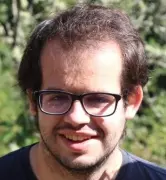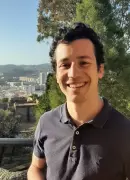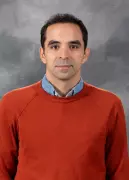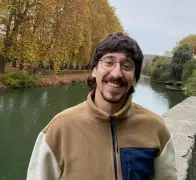 05/11/2025, 11:00 — 12:00 — Sala P3.10, Pavilhão de Matemática
05/11/2025, 11:00 — 12:00 — Sala P3.10, Pavilhão de Matemática
Joshua L. Wrigley, Université Paris Cité
Putting the logic back in non-commutative Stone duality
Many dualities in mathematics arise from the inherent duality of ‘syntax’ and ‘semantics’ in logic. Classical Stone duality, for example, is the syntax-semantics duality for theories of classical propositional logic, with Boolean algebras encoding the syntax of a propositional theory. The logical perspective on these ‘syntax-semantics’ dualities gives both an intuitive understanding for why mathematicians (or at least logicians) would expect these dualities to hold in the first place, as well as a framework to generalise to nearby logics.
In recent years, new ‘non-commutative’ generalisations of Stone duality have been discovered, involving inverse monoids and étale groupoids. Interestingly, this branch of duality theory was developed in the absence of a logical description. In this talk, we describe a class of logical theories whose syntax-semantics duality is given by a version of non-commutative Stone duality. Rather than originating in an exotic fragment of logic, these are theories of first-order logic which share many of the same properties as the theory of vector spaces, suggesting that non-commutative Stone duality is not so distant from classical logic as one might expect.
 30/06/2025, 16:00 — 17:00 — Sala P3.10, Pavilhão de Matemática
30/06/2025, 16:00 — 17:00 — Sala P3.10, Pavilhão de Matemática
Erkko Lehtonen, Khalifa University of Science and Technology, Abu Dhabi
On clones, minions, and clonoids, especially those of Boolean functions
We provide a brief introduction to the theory of clones, minions, and clonoids, which are sets of functions of several arguments with certain closure conditions defined in terms of function class composition. These notions arise in a natural way in universal algebra and they have proved useful in the analysis of computational complexity of constraint satisfaction problems. Our primary focus is on clonoids of Boolean functions, and we present classifications of clonoids in the spirit of Post's classification of clones. Moreover, we propose refinements and strengthenings to Sparks's theorem on the cardinalities of clonoid lattices.
 19/05/2025, 14:00 — 15:00 — Sala P3.10, Pavilhão de Matemática
19/05/2025, 14:00 — 15:00 — Sala P3.10, Pavilhão de Matemática
Miguel Barata, Utrecht University
An introduction to operads and operadic right modules
An operad P is a multivariable generalization of a category, first studied by Boardman, Vogt and May in the context of homotopy theory, where one allows for morphisms to have multiple inputs. The internal composition of P will encode some type of algebraic structure - such as an associative multiplication or a Lie bracket - and left actions by P will endow objects in a category with this extra algebraic information - thus defining associative monoids and Lie algebras in the previous examples. The operadic viewpoint has been of central importance in recent years in the world of highly-coherent algebra, but its influence has spread out to other areas of mathematics, such as mathematical physics, algebraic geometry and differential geometry.
In this talk I want to discuss what happens when operads act on the right instead, which leads to the notion of an operadic right module. The homotopy theory of such actions has had a revival in the last few years due to its connections to the Goodwillie-Weiss calculus of embedding spaces, which I hope to explain if time permits.
 10/04/2025, 15:00 — 16:00 — Sala P3.10, Pavilhão de Matemática
10/04/2025, 15:00 — 16:00 — Sala P3.10, Pavilhão de Matemática
Rafael Gomes, University of Málaga
Topological realization of finite group actions
Algebraic topology provides a natural framework for realizability problems, as it explores the interplay between algebraic structures and topological spaces. These questions have been around since the 1970's, with Steenrod asking when an algebra is the cohomology of a space and Kahn asking which groups are the group of self-homotopy equivalences of a simply-connected space. Addressing such questions deepens our understanding of both spaces and their associated algebraic structures, making them quite interesting.
In this talk, we present two recent realizability results concerning group actions. First, for any action of a finite group on a finitely presented abelian group, there exists a space that realizes this action as the canonical action of the group of self-homotopy equivalences on the first homology group. Second, we establish that any action of a finite group on a permutation module is the action of the group of self-homotopy equivalences of a space on its homology groups. Additionally, we show that any simplicial complex can be perturbed in a way that reduces the automorphism group to any chosen subgroup without changing the homotopy type.
(joint work with Cristina Costoya and Antonio Viruel)
 20/03/2025, 15:00 — 16:00 — Sala P3.10, Pavilhão de Matemática Online
20/03/2025, 15:00 — 16:00 — Sala P3.10, Pavilhão de Matemática Online
Manuel Rivera, Purdue University
An algebraic model for the free loop space
I will discuss geometric, algebraic, and combinatorial constructions related to loop spaces in topology. The talk will revolve around a functorial construction that models the passage from a topological space X to its free loop space LX. The input is a coalgebra equipped with additional structure and the output is a chain complex with a compatible “rotation” operator. The construction is dual in an appropriate sense to the Hochschild complex of a dg algebra/category. When applied to the coalgebra of chains on X, suitably interpreted, it produces a chain complex that is naturally quasi-isomorphic to the chains on LX with rotation operator corresponding to the circle action. This statement does not require any hypotheses on X (such as simple connectivity, nilpotence, finite type, etc…) or on the underlying ring of coefficients. The model turns out to be useful when studying and computing explicitly the structure of the free loop space of a manifold.
 16/01/2025, 15:00 — 16:00 — Sala P3.10, Pavilhão de Matemática
16/01/2025, 15:00 — 16:00 — Sala P3.10, Pavilhão de Matemática
Pedro Magalhães, Universitat de Barcelona
Formality of Kähler manifolds and mixed Hodge structures
The Formality Theorem of Deligne-Griffits-Morgan-Sullivan states that the rational homotopy type of a compact Kähler manifold is entirely determined by its cohomology ring. This provides homotopical obstructions for a compact complex manifold to admit a Kähler metric. On the other hand, by results of Deligne and Morgan, the rational homotopy groups of simply connected Kähler manifolds carry natural mixed Hodge structures. However, there exist diffeomorphic compact Kähler manifolds with the same pure Hodge structures on cohomology but with different mixed Hodge structures on rational homotopy groups. To better understand this phenomenon, in this talk I will introduce a "mixed Hodge formality" theory and provide complex geometric invariants obstructing this stronger notion of formality.
06/02/2024, 10:00 — 11:00 — Sala P3.10, Pavilhão de Matemática
Clover May, Norwegian University of Science and Technology
Classifying modules of equivariant Eilenberg-MacLane spectra
Cohomology with $\mathbb{Z}/p$-coefficients is represented by a stable object, an Eilenberg-MacLane spectrum $H\mathbb{Z}/p$. Classically, since $\mathbb{Z}/p$ is a field, any module over $H\mathbb{Z}/p$ splits as a wedge of suspensions of $H\mathbb{Z}/p$ itself. Equivariantly, cohomology and the module theory of $G$-equivariant Eilenberg-MacLane spectra are much more complicated.
For the cyclic group $G=C_p$ and the constant Mackey functor $\underline{\mathbb{Z}}/p$, there are infinitely many indecomposable $H\underline{\mathbb{Z}}/p$-modules. Previous work together with Dugger and Hazel classified all indecomposable $H\underline{\mathbb{Z}}/2$-modules for the group $G=C_2$. The isomorphism classes of indecomposables fit into just three families. By contrast, we show for $G=C_p$ with $p$ an odd prime, the classification of indecomposable $H\underline{\mathbb{Z}}/p$-modules is wild. This is joint work in progress with Grevstad.
30/01/2024, 14:30 — 15:30 — Sala P3.10, Pavilhão de Matemática
Kazim Büyükboduk, University College Dublin
Rational points on elliptic curves (and their p-adic construction)
The negative answer to Hilbert's 10th problem tells us that determining whether or not an algebraic variety should carry any rational points or not is impossibly hard (literally!). The same problem even for curves is difficult: For elliptic curves, this is the subject of the celebrated Birch and Swinnerton-Dyer conjecture. I will survey recent results on this problem, and explain briefly an explicit p-adic analytic construction of rational points of infinite order on elliptic curves of analytic rank one (settling a conjecture of Perrin-Riou). These final bits of my mostly expository talk will be a report on joint works with Rob Pollack & Shu Sasaki, and with Denis Benois.
07/06/2023, 11:00 — 12:00 — Sala P3.10, Pavilhão de Matemática
Petr Vojtěchovský, University of Denver
Quandles: Introduction and recent developments
Quandles are algebraic structures that play a prominent role in knot theory and also form a class of set-theoretic solutions of the Yang-Baxter equation. After a brief introduction to quandles, I will focus on recent developments and open problems, including the Hayashi conjecture and the isomorphism problem for principal quandles.
25/05/2023, 15:30 — 16:30 — Sala P3.10, Pavilhão de Matemática
Alexander Yom Din, Hebrew University of Jerusalem
On tempered representations
Given a locally compact group G, the decomposition of the space of square integrable functions on G into irreducible unitary representations of G (“irreps”) is one of the basic desires in harmonic analysis. Not all irreps appear in such a decomposition; those which do are called tempered. The decomposition has a discrete as well as a continuous parts; the irreps which appear in the discrete part are called square integrable, and are much simpler analytically than general tempered irreps. Loosely speaking, tempered irreps can be thought of as “on the verge” of being square integrable. Although this intuition is rather classical, we discuss a new possible formal interpretation of it. This is joint work with D. Kazhdan.
08/03/2023, 13:30 — 14:30 — Sala P3.10, Pavilhão de Matemática
Marcel de Jeu, Leiden University
Free objects in algebraic and analytic categories
In this expository lecture, we will explain how results from universal algebra can be used to construct free objects in various algebraic categories, such as the free unital vector lattice algebra over a vector space. Starting from these free objects of an algebraic nature, we then proceed to construct normed objects, such as unital Banach lattice algebras, that solve universal problems in analytic categories. These, in turn, can be used to construct free objects in larger analytic categories, such as the free complete locally convex-solid topological vector lattice algebra over a Banach space.
This is joint work with Walt van Amstel.
10/11/2022, 16:30 — 17:30 — Sala P3.10, Pavilhão de Matemática
Sarah Petersen, MPIM Bonn
The $RO(C_2)$-graded homology of $C_2$-equivariant Eilenberg-MacLane spaces
This talk describes an extension of Ravenel-Wilson Hopf ring techniques to $C_2$-equivariant homotopy theory. Our main application and motivation for introducing these methods is a computation of the $RO(C_2)$-graded homology of $C_2$-equivariant Eilenberg-MacLane spaces. The result we obtain for $C_2$-equivariant Eilenberg-MacLane spaces associated to the constant Mackey functor $\underline{\mathbb{F}}_2$ gives a $C_2$-equivariant analogue of the classical computation due to Serre at the prime 2. We also investigate a twisted bar spectral sequence computing the homology of these equivariant Eilenberg-MacLane spaces.
07/06/2022, 14:30 — 15:30 — Sala P3.10, Pavilhão de Matemática
Manpreet Singh, CAMGSD
Some properties of link quandles
Classical knot theory is the study of smooth embeddings of circles in the 3-sphere up to the ambient isotopy. One of the fundamental problems in this field is the classification of knots, for which one needs invariants. The fundamental group of a knot complement space is a well-known invariant, but there are examples where it fails to distinguish knots. Around the 1980s, Matveev and Joyce introduced an almost complete knot invariant using quandles, known as knot quandles.
In the talk, I will introduce the notion of residual finiteness of quandles and prove that all link quandles are residually finite. Using the preceding result, we will see that the word problem is solvable for link quandles. I will talk about the orderability properties of link quandles. Since all link groups are left-orderable, it is reasonable to speculate that link quandles are left (right)- orderable. In contrast, we will see that the orderability of link quandles behave quite differently than that of the corresponding link groups.
07/06/2022, 11:00 — 12:00 — Sala P3.10, Pavilhão de Matemática
Rachid El Harti, Université Hassan I, Morocco
On subalgebras of crossed product Banach algebras
We characterize intermediate subalgebras between a C*-algebra $A$ and the crossed product $A\rtimes_\alpha G$ or $\ell^1(G,A,\alpha)$, for actions $\alpha$ of discrete groups $G$ on a C*-algebras $A$.
17/01/2020, 11:00 — 12:00 — Sala P3.10, Pavilhão de Matemática
Pedro Boavida, Instituto Superior Técnico, Universidade de Lisboa
Classifying spaces of infinity-sheaves on manifolds
I will describe how one can associate a “classifying space” to an infinity (alias homotopy) sheaf on the category of manifolds. This is based on joint work with D. Berwick-Evans and D. Pavlov (arXiv:1912.10544.), and is a homotopical strenghtening of a theorem of Madsen and Weiss. Examples abound.
Projecto FCT UIDB/04459/2020.
24/10/2019, 14:00 — 15:00 — Sala P4.35, Pavilhão de Matemática
António Girão, University of Birmingham
Dirac's theorem for random regular graphs
In 1952, Dirac proved that any graph on $n$ vertices with minimum degree $n/2$ contains a Hamiltonian cycle, i.e. a cycle which passes through every vertex of the graph exactly once. We prove a resilience version of Dirac’s Theorem in the setting of random regular graphs. More precisely, we show that, whenever $d$ is sufficiently large compared to $\epsilon \gt 0$, a.a.s. the following holds: let $G_0$ be any subgraph of the random $n$-vertex $d$-regular graph $G_{n,d}$ with minimum degree at least $(1/2 + \epsilon)d$. Then, $G_0$ is Hamiltonian. This proves a conjecture of Ben-Shimon, Krivelevich and Sudakov. Our result is best possible: firstly, the condition that $d$ is large cannot be omitted, and secondly, the minimum degree bound cannot be improved. This is joint work with Padraig Condon, Alberto Espuny Díaz, Daniela Kuhn and Deryk Osthus.
Projecto FCT UID/MAT/04459/2019.
23/10/2019, 14:00 — 15:00 — Sala P3.10, Pavilhão de Matemática
Jorge António, Université Paul Sabatier (Toulouse III)
Derived Geometry and its applications
In this talk, we are going to present a user-friendly approach to derived geometry. One of our goals is to convince the audience that the notions of derived manifold / scheme / space / stack are just as natural as their classical counterparts. After having introduced the basic techniques, we will apply them to study certain moduli spaces of geometrical origin. Derived geometry also has recently found applications in arithmetics, which we will try to explain in the last part of the talk.
Projecto FCT UID/MAT/04459/2019.
13/09/2019, 11:00 — 12:00 — Sala P3.10, Pavilhão de Matemática
Marcel de Jeu, Leiden University and University of Pretoria
Positive representations of algebras of continuous functions
It is well known from linear algebra that a family of mutually commuting normal operators on a finite dimensional complex inner product space can be simultaneously diagonalised. Strongly related to this is the fact that a representation of a commutative C*-algebra on a Hilbert space is generated by a so-called spectral measure, taking its values in the orthogonal projections. A result by Ruoff and the lecturer asserts that a similar phenomenon occurs for positive representations of algebras of continuous functions on a substantial class of Banach lattices.
Recently, it has become clear that these two facts for Hilbert spaces and Banach lattices can be understood from one underlying general theorem for positive homomorphisms of algebras of continuous functions into partially ordered algebras. This result can be proved by purely order-theoretic methods.
In this lecture, we shall explain this theorem and how it relates to the two special cases mentioned above. We shall also sketch the theory of measure and integration in partially ordered vector spaces that is necessary to formulate and establish it.
This is joint work with Xingni Jiang.
Projecto FCT UID/MAT/04459/2019.
09/05/2019, 11:00 — 12:00 — Sala P3.10, Pavilhão de Matemática
Mark Lawson, Heriot-Watt University
Non-commutative Boolean algebras
In this talk, I shall explain how the classical theory of Stone duality may be generalized to a non-commutative setting. This theory has connections with étale groupoids, quantales, groups and inverse semigroups.
Some of the work was joint with Alina Vdovina. I shall assume no prior exposure to this theory.
Projecto FCT UID/MAT/04459/2019.
24/04/2019, 14:30 — 15:30 — Sala P4.35, Pavilhão de Matemática
João Fontinha, ETH Zurich
A primer on the Section Conjecture — a bridge between arithmetic and homotopy
In 1983, Grothendieck wrote a letter to Faltings in which he formulated a conjecture for hyperbolic curves over fields which are finitely generated over the rationals. Remaining open to date, it carries the study of rational points on an algebraic variety to the realm of profinite groups. Assuming only a working knowledge of basic Algebraic Geometry, we formulate and motivate the Section Conjecture and outline some modern attempts to tackle it.
Projecto FCT UID/MAT/04459/2019.


